
Free Dublin Delivery – Fresh Coffee to Your Door!

For coffee enthusiasts, the quest for the perfect cup often begins with understanding the source: the coffee bean. The world of coffee is vast and varied, with each region imparting unique characteristics to its beans, influenced by climate, soil, and processing methods. At Sensações Store, we pride ourselves on offering a curated selection of the best coffee beans from around the globe, inviting you to discover the rich tapestry of flavors that await.
This guide will take you on a journey through some of the most celebrated coffee-growing regions, highlighting the distinct profiles of the single-origin the best coffee beans available at Sensações Store. Whether you’re a seasoned connoisseur or just beginning your coffee exploration, understanding these origins is key to unlocking an unparalleled brewing experience.
Brazil stands as the undisputed giant in coffee production, contributing significantly to the global supply. Brazilian coffee beans are often characterized by their smooth, low-acid profile, making them a versatile choice for a wide range of brewing methods. Grown predominantly at lower altitudes, these beans develop a consistent and approachable flavor that forms the backbone of many espresso blends.
At Sensações Store, our Brazilian Coffee beans – Café du Jour offer a delightful experience with notes of chocolate, nuts, and a pleasant sweetness. They are perfect for those who appreciate a mellow and comforting cup, ideal for a morning brew or as a base for milk-based coffee drinks.
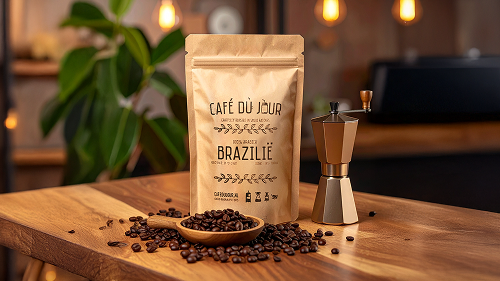
Colombia is synonymous with high-quality coffee, renowned for its consistent and well-balanced beans. Grown in the rich volcanic soils of the Andes mountains, Colombian coffee benefits from ideal climatic conditions that contribute to its distinctive bright acidity and vibrant flavor profile. These beans are typically washed processed, which further enhances their clean and crisp characteristics.
Discover the vibrant taste of our Colombian Coffee Beans – Café du Jour at Sensações Store. You’ll find a harmonious blend of fruity notes, often with hints of citrus or berry, and a subtle sweetness that makes for an incredibly refreshing and versatile cup. Colombian beans are an excellent choice for drip coffee, pour-over, or any method where you want the nuanced flavors to shine.
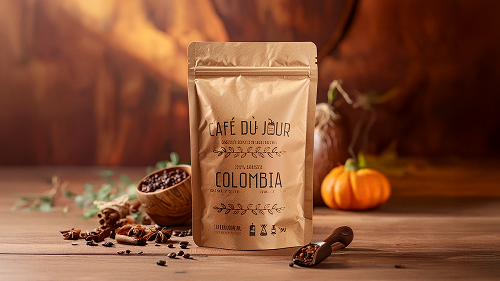
Ethiopia, the legendary birthplace of coffee, offers some of the most unique and complex flavor profiles in the world. Ethiopian coffee beans are often grown wild or in small garden plots, and their processing methods (natural or washed) significantly influence their final taste. These beans are celebrated for their intense aromatics and often surprising floral and fruity notes.
Explore the exotic and aromatic world with our Ethiopian Coffee Beans – Café du Jour from Sensações Store. Expect a bright acidity and a symphony of flavors ranging from jasmine and bergamot to blueberry and citrus. Ethiopian coffees are a true adventure for the palate, best enjoyed through brewing methods that highlight their delicate complexities, such as pour-over or AeroPress.
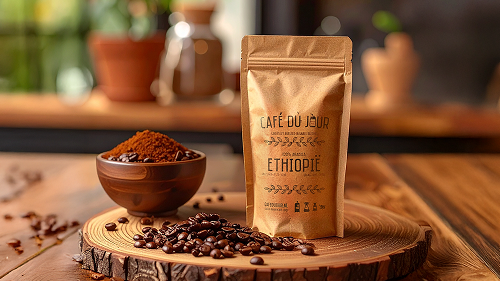
Kenyan coffee is highly sought after for its distinctive bright acidity, full body, and complex, wine-like flavors. Grown on the high plateaus around Mount Kenya, these beans benefit from rich volcanic soil and meticulous processing, including a unique double-fermentation process that contributes to their renowned intensity and clarity of flavor.
Experience the bold and nuanced profile of our Kenyan Coffee Beans – Café du Jour at Sensações Store. These beans deliver a vibrant acidity, often with notes of blackcurrant, tomato, and a rich, savory undertone. Kenyan coffees are a favorite among those who appreciate a powerful and intricate cup, perfect for exploring the depths of coffee flavor.
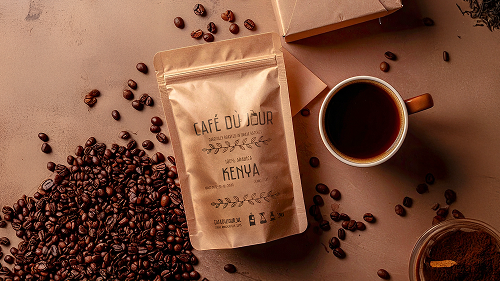
Peruvian coffee, primarily cultivated by smallholder farmers in the majestic Andes mountains, is gaining global recognition for its clean, mild, and often sweet characteristics. These beans are frequently grown organically and are part of fair-trade initiatives, reflecting a commitment to sustainable and ethical practices.
Discover the smooth and balanced taste of our Peruvian Coffee Beans – Café du Jour at Sensações Store. You’ll find a gentle acidity, notes of nuts and chocolate, and a consistently clean finish. Peruvian coffees are an excellent choice for those who prefer a mellow and approachable cup that can be enjoyed throughout the day, offering a comforting and satisfying experience.
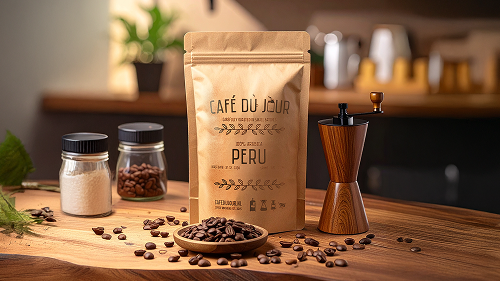
At Sensações Store, we are passionate about bringing you the best coffee beans from around the world. Each origin offers a unique story and a distinct flavor profile, waiting to be discovered. Whether you’re seeking the comforting familiarity of Brazilian beans, the vibrant brightness of Colombian, the exotic complexity of Ethiopian, the bold intensity of Kenyan, or the clean balance of Peruvian, we have a coffee bean that will elevate your brewing experience.
We invite you to explore our selection and embark on your own coffee adventure. Grinding your beans fresh just before brewing ensures that you capture the full spectrum of aromas and flavors that these exceptional origins have to offer. Elevate your daily ritual and taste the world in a cup with Sensações Store.

Just like fine wines, the flavor of the best coffee beans is profoundly influenced by their terroir – a French term that encompasses the complete natural environment in which a particular coffee is produced, including factors such as soil, topography, and climate. These elements interact in complex ways to shape the unique characteristics of the coffee cherry, and subsequently, the bean.
Coffee plants thrive in specific climatic conditions, typically found in the “Bean Belt” – the equatorial regions between the Tropics of Cancer and Capricorn. Within this belt, altitude plays a crucial role. Higher altitudes, often characterized by cooler temperatures and distinct wet and dry seasons, lead to slower maturation of the coffee cherry. This extended ripening period allows the beans to develop more complex sugars and acids, resulting in a denser bean with a more nuanced and aromatic flavor profile. For instance, the bright, floral notes often found in Ethiopian coffees are a direct result of their high-altitude cultivation.
The soil in which coffee plants grow provides the nutrients that contribute to the bean’s flavor. Volcanic soils, rich in minerals, are particularly prized for coffee cultivation. For example, the fertile volcanic slopes of Colombia and Kenya contribute to the vibrant acidity and full body of their respective coffees. The specific mineral content can influence everything from the sweetness to the acidity and even the mouthfeel of the final brew.
The amount and distribution of rainfall, along with the intensity of sunlight, are critical. Adequate rainfall is necessary for the healthy growth of the coffee plant, while periods of dryness can stress the plant, leading to a concentration of flavors in the cherry. Sunlight exposure affects photosynthesis and the development of sugars within the bean. Regions with consistent cloud cover or shade-grown coffee often produce beans with more delicate and complex flavors, as the slower growth allows for greater development of aromatic compounds.
While not strictly part of the natural environment, the processing methods employed after harvest are deeply tied to the region’s traditions and resources, and they significantly impact the final flavor. The two primary methods are:
•Washed (Wet) Process: This method involves removing the fruit pulp from the bean before drying. It typically results in a cleaner, brighter, and more acidic cup, allowing the inherent flavors of the bean to shine through. Many high-quality Colombian and Central American coffees use this method.
•Natural (Dry) Process: In this method, the coffee cherries are dried with the fruit intact. This allows the sugars from the fruit to impart sweetness and fruity notes to the bean, often resulting in a fuller-bodied coffee with more intense, sometimes fermented, flavors. Ethiopian and Brazilian natural processed coffees are famous for their distinct fruity and wine-like characteristics.
•Honey Process (Pulped Natural): A hybrid method where some of the fruit pulp is left on the bean during drying. This can result in a coffee with a balance of the clean notes from washed coffees and the sweetness and body of natural coffees, often with a honey-like sweetness.
Each of these factors, from the elevation of the farm to the way the beans are processed, contributes to the unique sensory experience of coffee from different origins. Understanding this intricate relationship helps appreciate why a Brazilian coffee tastes different from an Ethiopian one, and why exploring these regional nuances is a rewarding journey for any coffee lover.
For discerning coffee drinkers, understanding how to assess the quality of coffee beans is paramount. Beyond simply choosing a reputable roaster or a specific origin, there are objective measures and sensory cues that can help you identify truly exceptional beans. This knowledge empowers you to make informed choices and ensures that every cup you brew is of the highest standard.
One of the most reliable indicators of coffee quality, particularly for specialty coffee, is the Specialty Coffee Association (SCA) score. The SCA has developed a rigorous cupping protocol and scoring system that evaluates coffee based on ten key attributes: fragrance/aroma, flavor, aftertaste, acidity, body, uniformity, clean cup, sweetness, balance, and overall impression. Each attribute is scored on a 10-point scale, and the sum of these scores determines the final quality rating.
•What the Score Means:
•80 points and above: Coffee scoring 80 points or higher is classified as “specialty coffee.” This designation signifies that the coffee is free of defects and possesses distinct attributes in at least one of the ten categories. The higher the score, the more exceptional and nuanced the coffee is considered to be.
•Below 80 points: Coffees scoring below 80 points are generally considered commercial grade, lacking the unique characteristics and complexity of specialty coffees.
At Sensações Store, we are committed to offering only the best coffee beans, and all our premium coffees, including our single-origin selections, boast an SCA score of above 80 points. This commitment ensures that you are receiving beans that have been rigorously evaluated for their superior quality and exceptional flavor profiles.
While we will delve deeper into the nuances of Arabica coffee in a future article, it’s important to note its significance when discussing coffee quality. The vast majority of specialty coffee, including all the premium single-origin beans offered at Sensações Store, are 100% Arabica. Arabica beans (Coffea arabica) are celebrated for their complex aromatic profiles, delicate flavors, and balanced acidity, which are highly valued in the specialty coffee world. Their demanding cultivation requirements often contribute to their superior quality compared to Robusta beans.
Even before brewing, you can assess bean quality through visual inspection:
•Green Beans (before roasting): High-quality green beans should be uniform in size and color, free from defects like insect damage, broken pieces, or discoloration. They should have a fresh, slightly grassy aroma.
•Roasted Beans: Look for uniformity in roast color. Beans should not appear scorched or unevenly roasted. A good roast will highlight the bean’s inherent qualities. Avoid beans that are excessively oily (unless it’s a very dark roast, where some oil is expected) or have a dull, lifeless appearance. The aroma should be rich and inviting, not stale or burnt.
Regardless of origin or SCA score, freshness is paramount. Coffee beans are at their peak flavor within a few weeks of roasting. Look for a roast date on the packaging. Freshly roasted beans will produce a more vibrant aroma and a richer, more complex flavor in your cup. Stale beans, on the other hand, will result in a flat, lifeless brew.
By understanding these indicators of quality, you can confidently select the best coffee beans and embark on a truly exceptional coffee journey. At Sensações Store, we take pride in sourcing and providing beans that meet these stringent quality standards, ensuring that every bag you purchase delivers an unparalleled sensory experience.
Other people also read

Coffee is a beloved beverage worldwide, cherished for its rich aroma, invigorating taste, and the comforting ritual it provides. For

In the quest for a healthier lifestyle and effective weight management, many are turning to natural solutions that offer sustainable
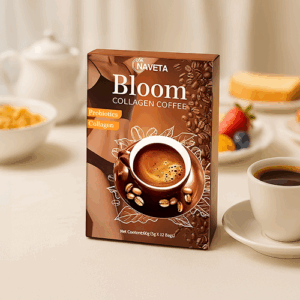
In a world where self care meets convenience, Bloom Collagen Coffee has become a staple in the daily rituals of
Sensações Store
Adm: José Ângelo gomes Nunes
Irl.tax.0052834OB
Griffith walk – Dublin
Email: [email protected]
Tel: +353 89 982 2670
© 2024 Sensações Online. All rights reserved.